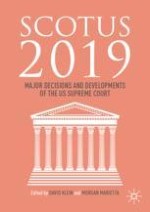2020 | OriginalPaper | Buchkapitel
12. Timbs v. Indiana on Excessive Fines and Civil Forfeitures
verfasst von : Marian R. Williams
Erschienen in: SCOTUS 2019
Aktivieren Sie unsere intelligente Suche, um passende Fachinhalte oder Patente zu finden.
Wählen Sie Textabschnitte aus um mit Künstlicher Intelligenz passenden Patente zu finden. powered by
Markieren Sie Textabschnitte, um KI-gestützt weitere passende Inhalte zu finden. powered by
